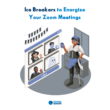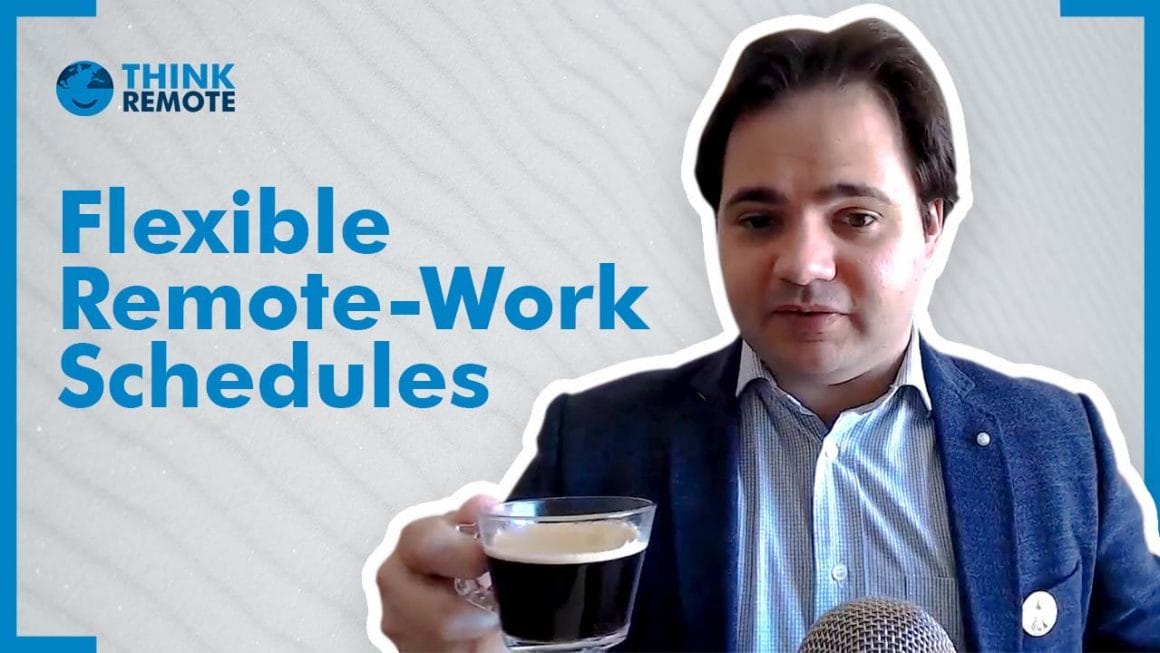Remote work schedules are flexible. But are they too flexible? Do people misunderstand the context of the word “flexible”? Luis shares his views on the topic.
As human beings, we are really, really, really, really bad at estimating. Ever had an exam that you crammed for last minute, and then you figured it out that, “Oh, there’s no way I can study everything that’s relevant at the last minute”? Misinterpreting the word “flexible” when it comes to remote work schedules is the same thing. Flexibility means that even though you’ve committed to work that full work day, those eight hours multiple thing can happen on the personal front too. In this video, Luis shares how one can combat unproductive days at remote work.
Watch this space every day for the latest news, tips and stories from the remote work world!
Luis:
Remote work means that you can work whenever you like wherever you like. Right? Right? Welcome. This is Virtual Coffee chat with Luis. That’s me for ThinkRemote, let’s have that first nice sip of the day. Nice. I actually cheated. This is not the mug of coffee, this is a double of espresso. So I rather like my espresso. Yes, before you ask, it’s still hard to get a haircut here in Portugal, COVID-19 things. But let’s talk about what matters, that’s remote work. Let’s talk about schedule, and how flexible schedules are with remote work. Except maybe they’re a little bit too flexible. Let’s talk about what that means.
Now. I love where I work at, and I think we have some pretty good policies. Now, when people ask me about scheduling, I say that “We have flexible schedule, flexible scheduling, but we expect eight hours of productivity.” Why do I say this specifically? Well because the reality is that when you approach work as a, “Oh, it’s flexible. So that means that I’ll do work whenever I feel like it, or whenever I can fit it into my day.”, you’re going to have a bad time. The people you work for are probably not going to be very happy with you. Let me explain why. As human beings, we are really, really, really, really bad at estimating. I mean, you ever had an exam that you crammed for last minute, and then you figured it out that, “Oh, there’s no way I can study everything that’s relevant at the last minute”? Or a group work or something like that. Right? Remember back in those days of school.
Now, maybe you were more responsible than me and then most of my friends. But I’m willing to bet that at least a decent percentage of you know what that feels like. So when work is flexible and when a company assumes a completely flexible stand, that usually means that that people procrastinate until the last minute, and then when things need to get done, they run around like headless chickens and that’s not optimal. Now I still think that work-life balance should be a priority and that you should work when it’s the best time for you, when you feel the most productive. That’s what I do but what I do is I still account on my calendar. I still look an eight hour period for work. Right?
I recommend people do that, because the reality is that most of us aren’t going to be super humanly productive just because we work at the best hours for us. Or at the opposite, right? Just because we don’t get to work at the perfect time, we’re not going to be terribly unproductive. So here’s the plan. The thing that I do now, do I work eight hours a day every day? No, some days I work eight hours, some days I work 12. Most days I would chop my actual productivity to something to four, and six hours. But it’s still important to have that blocked time off for work. Because what that allows us to do, if I block those eight hours in my calendar and I assign those hours to work, that gives me leeway for unproductive periods. That gives me leeway for things that I couldn’t predict, like emergencies like that, that. That’s what flexibility means.
Flexibility means that even though I’ve committed to work that full work day, those eight hours, my wife’s car can break down and I can say, “Oh, no problem. I’ll take you. Let’s use my car.” Or, something comes up, right? My mother comes to visit and I can spend some nice time with my mom. Right? That’s what flexibility ultimately means. I’m a writer. I’ve written a couple of books. It’s not a lot I know, but it’s something. If you go at it with the mentality if you go at it with the mentality of, “Well, I’m going to write whenever I feel like writing, write whenever I really feel that the muse inspires me and all of that.” I’m sorry to say you’re probably not ever going to write anything meaningful or significant because you need to show up before the muse does, and it’s the same with work.
So that’s the main point why I wanted to have this little coffee chat today. Because it’s nice to think that, “Oh, the next step in remote work is unicorns and rainbows and you work whenever you feel that’s optimal.” But let’s face it, even if you love your work, some days work is just work. So I would caution you against taking a completely flexible approach to work, right? Set at a time for starting work and set a time for finishing work. That doesn’t even have to be eight hours, though I do think that most people need to block off an eight hour period. I certainly do in order to achieve what’s expected in a normal productive day.
But the reality is that it’s a guideline. You shouldn’t be a slave to your calendar, the calendar is a tool. Because we human beings are very bad at estimating time that a tasks takes to be done, it’s good to have that basic metric of eight hours. Then if you get your work done in four hours, then great right? Take the rest of the day off. You don’t need to slave virtually, be at your desk as if it would be in the office. That’s the good part about remote. But just don’t take that approach where you think that, “Oh, I’m going to fit in… I’m at home, I have tons of things to do, and I’m going to fit work in between.” In my experience that in-between space tends to “Poof!”, disappear.
So anyway, those are my 2 cents on flexibility. I’m not super in love with the eight hour workday, mostly because I believe that no one really puts eight hours of productivity into eight hours of work. But it’s a pretty good metric. It’s a pretty good metric just to have as a guideline, to bookend the beginning and the end of your workday. Then you fit during that period that’s for work, maybe you can fit other things in between. That’s wonderful, but you really should commit to a nice chunky time block of your day to work.
Then that time block itself should be managed into creative time, management time, et cetera, et cetera. But that’s a topic for a whole nother morning coffee. I hope that you enjoyed this Virtual Coffee Chat with Luis, that’s me for ThinkRemote. Stay tuned. I do believe that these are the, this is the last or the last couple of days where you can subscribe at ThinkRemote to qualify for winning a nice, nice standing desk prize. So if you haven’t, and if you’re looking at this video on the day of release, go there and check it out and the winners will be out soon. See you tomorrow.






